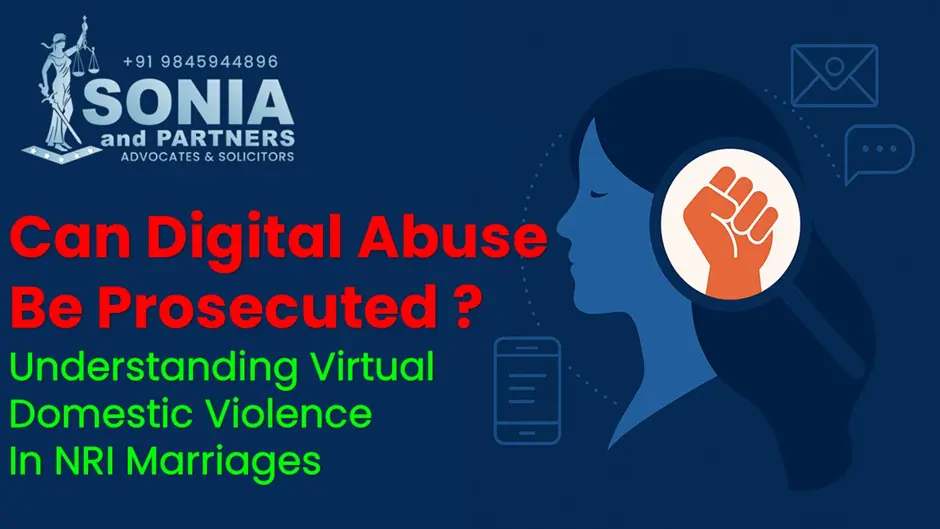
Introduction
What is Digital Abuse?
Digital abuse is the use of technology to harass, control, stalk, or intimidate a partner. Common forms include:
- Cyberstalking
- Online Harassment
- Non-consensual Sharing of Intimate Images (Revenge Porn)
- Digital Surveillance or Tracking
- Financial Abuse through Digital Platforms
For Indian citizens in NRI marriages, such abuse often spans borders, creating legal complications and emotional distress.
Global Legal Responses to Digital Abuse
Countries worldwide are beginning to recognize digital abuse as a serious offense and have enacted legislation to combat it:
⛰️ Ireland: The Harassment, Harmful Communications and Related Offences Act 2020 (Coco's Law) criminalizes sharing intimate images without consent.
🇬🇧 United Kingdom: The Online Safety Act 2023 mandates tech companies to remove harmful content such as explicit deepfakes and revenge porn. Ofcom now holds platforms accountable.
🇰🇷 South Korea: Criminalizes not just the creation but also the viewing of non-consensual deepfake pornography.
🇳🇱 New Zealand: The Harmful Digital Communications Act 2015 imposes heavy fines and jail time for digital harassment and revenge porn.
🇸🇴 Singapore: Amendments to the Protection from Harassment Act (2019) introduced criminal penalties for doxxing and cyberbullying.
🇺🇸 USA: Federal laws criminalize online threats and stalking, with most states also adopting specific cyber harassment laws.
🇪🇺 European Union: The Istanbul Convention includes measures for tackling online and technology-facilitated violence.
These global reforms show an increasing consensus: digital spaces must be as protected as physical ones.
Can Indian Citizens Married to NRIs Take Legal Action for Digital Abuse?
Absolutely. Indian law offers several pathways for citizens married to NRIs who are facing digital abuse. Here's how:
1. Domestic Violence Act (PWDVA, 2005)
⦁ File a Domestic Incident Report (DIR) with a Protection Officer or Magistrate.
⦁ Claim relief such as protection orders, residence rights, or monetary compensation.
⦁ Applicable even if the abuser is living abroad.
2. Indian Penal Code & IT Act Provisions
| Offense | Applicable Law |
|---|---|
| Cyberstalking | IPC Sec 354D / SEC 78 of BNS |
| Online Threats | IPC Sec 506 / Sec 351 of BNS |
| Obscene Content | IPC Sec 509 / Sec 79 of BNS, IT Act 67A |
| Identity Theft | IT Act Sec 66C & 66D |
Complaints can be filed via:
⦁ Local police cyber cell
⦁ National Cyber Crime Reporting Portal: www.cybercrime.gov.in
⦁ As a PCR (Private Complaint Report) at the court
3. Passport Impounding & Red Corner Notice
Indian courts can:
⦁ Issue Non-Bailable Warrants (NBWs)
⦁ Request MEA to impound the accused NRI's passport
⦁ Seek Red Corner Notice via INTERPOL
4. National Commission for Women (NCW)
⦁ Has a dedicated NRI Cell
⦁ Coordinates with embassies
⦁ Assists in tracing absconding spouses
⦁ Offers legal aid and counselling
5. Mutual Legal Assistance Treaty (MLAT)
If digital evidence resides on foreign servers, Indian authorities can access it via MLATs. This allows evidence from platforms like Facebook or WhatsApp to be used in Indian courts.
Real-World Digital Abuse Scenarios in NRI Marriages
⦁ Remote Surveillance: Using spyware to track partner's location from abroad
⦁ Financial Blackmail: Freezing joint digital accounts
⦁ Revenge Porn: Uploading private content to international platforms
⦁ Social Media Defamation: Posting humiliating material on Facebook or Instagram
These situations highlight how distance doesn't diminish the harm inflicted—and why legal action must follow swiftly.
Practical Steps for Victims
⦁ Collect Evidence: Screenshots, call logs, emails, IP addresses
⦁ Approach Local Police or File an e-FIR
⦁ Engage a Lawyer Specializing in NRI Disputes www.lawyersonia.com
⦁ Reach Out to Indian Embassy If Residing Abroad
⦁ Register a Case with NCW’s NRI Cell
Summary
Digital abuse is not a lesser form of violence—its impact can be equally traumatic and long-lasting. For Indian citizens trapped in NRI marriages plagued by virtual domestic violence, legal remedies exist and are actionable. With growing international and domestic legal frameworks, survivors are no longer helpless.
If you or someone you know is facing digital abuse, reach out to a qualified lawyer, cyber cell, or women’s rights organization immediately. Justice doesn’t stop at borders—and neither should you.
For personalized legal advice tailored to your unique situation, feel free to consult us. You may wish to reach us at +91 9845944896 or write to us at mail@lawyersonia.com We are committed to guiding you through every step of the divorce process, ensuring that your rights are protected and your future is secure.
 11:00 – 19:00
11:00 – 19:00